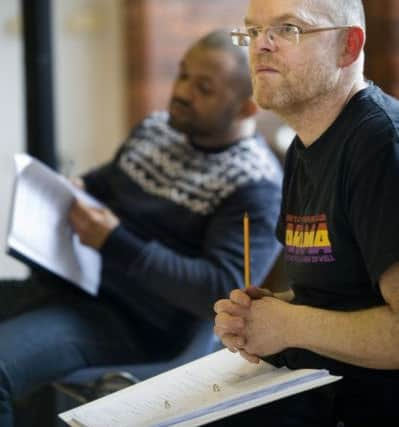Why losing Arts Council funding can make theatres better businesses


On July 1, 2014 Rod Dixon’s phone was ringing off the hook. It was the same again yesterday, but this time for very different reasons. Three years ago, the artistic director of Leeds-bsed Red Ladder theatre company was just coming to terms with news that, after 14 years of consecutive funding, Arts Council England had axed its £160,000 annual grant.
It was a bitter blow – the money had covered the cost of two national tours – but three years on and having survived through a combination of crowdfunding, clever thinking and a little help from The Damned United author David Peace, the team at Red Ladder has now been welcomed back into the funding fold.
Advertisement
Hide AdAdvertisement
Hide AdRegaining National Portfolio status, which basically guarantees funding from 2018 to 2022 has been a long and sometimes painful journey, but the £660,000 it will receive over those four years will make every step worth it.


“I was picking up the company van from the garage when I got the call we were back,” says Dixon. “No one has a god-given right to Arts Council funding, but we have learnt a lot over the last three years and while it has been tough, we are probably a better, more business-like company as a result.”
In truth, 2014 was a difficult year for all concerned. The Arts Council itself was also under the cosh and having seen its own budget slashed, there was no option but to pass those cuts onto the organisations it invested in.
While the shadow of austerity hasn’t entirely lifted, this latest announcement does appear to represent a brighter future for culture in the regions, something the Arts Council has been promising for as long as anyone can remember.
Advertisement
Hide AdAdvertisement
Hide AdYorkshire will receive £157m of funding – an increase of 16 per cent which will be worth an extra £5.3m in the first year alone. It’s a picture repeated across the country and is the result of a decision to give a little less to some big-hitters, with the likes of the National Theatre taking an average three per cent cut.


The news might not have gone down well in some sectors, but as a result the Arts Council will now be able to invest an extra £170m in regional arts organisations and Dixon knows just how vital that funding can be.
“We know what it feels like to be on the losing side of these announcements and our best wishes go to everyone who has missed out,” says Dixon. “However, it’s not the end. When we lost our funding we thought it best to keep a dignified silence, but some of our supporters were incredibly angry and launched a fundraising campaign on our behalf. Within six months, with the support of the likes of Phill Jupitus and Terry Jones, it had reached £20,000 and in the end we raised £40,000.
“David Peace also gave us the rights to stage his novel The Damned United about Brian Clough’s turbulent 44 days in charge at Leeds United, which was a big help.
Advertisement
Hide AdAdvertisement
Hide Ad“Surviving outside of the Arts Council’s National Portfolio isn’t easy. In fact it’s exhausting, but we showed we could do it and we also showed there was a need for the kind of work we do. Now those efforts have been rewarded.”
Dixon wasn’t alone in raising a glass or two as the full details of the Arts Council’s four-year plan became clear. Yorkshire now boasts 91 National Portfolio Organisations and 21 of them are either receiving funding for the first time or, like Red Ladder, have regained their status.
Among them is Mikron Theatre, which was launched in the 1960s when jobbing actor Mike Lucas decided his mission was to take theatre to unusual venues and new audiences. Based in Marsden, the company tours the country by canal and in recent years has performed work in fish and chip shops, lifeboat stations and youth hostels – one of its recent productions was appropriately entitled Best Foot Forward.
All seemed to be ticking along nicely, but in 2010 the rug was pulled from the company’s carefully-laid plans. All Mikron’s formal funding was cut and, during increasingly fraught board meetings, there was even talk about having to sell its beloved narrowboat, Tyseley. However, like Red Ladder, Mikron triumphed in adversity and is now staring at a much brighter future having secured £191,200 of funding.
Advertisement
Hide AdAdvertisement
Hide Ad“I won’t lie, there were times when we did wonder whether we would get to see our 40th anniversary,” says general manager Pete Toon. “But then as word got out that our finances weren’t great we suddenly started receiving cheques through the post. It made us realise that it wasn’t just us who thought this company and the work it produces was important. I guess it cemented our resolve to find a way to carry on.”
And carry on they did, but Pete admits that there is a security of continuity which only comes with being a NPO.
“Long-term planning in the arts is notoriously difficult and even more so when you don’t know what money you’ll have in the coffers for the following 12 months. When we were really struggling the Esmée Fairbairn Foundation stepped in and we will always be grateful to the help they gave us, but having a regular, guaranteed income stream for four years is just an incredible feeling.
“How much will it change what we do? Well Mikron will stay the same, but it will allow us to do what we have always done, just that bit better. We are committed to developing new talent and to take our work to people who live in postcodes which don’t generally go to the big theatres. Now we just have that bit of breathing space to take stock.
Advertisement
Hide AdAdvertisement
Hide Ad“If the last few years has taught us anything it’s that the arts is a business. Because companies like ours stage wonderful, sometimes eccentric productions, there is a temptation to think that’s enough. It isn’t. It has to pay, it all has to add up.”
Experiencing first hand the highs and lows of arts funding isn’t the only thing Red Ladder and Mikron share in common. Next year, Mikron will sail into their 50th year of touring and Red Ladder will also notch up half a century of performances. Not bad, given a few years ago both were one step away from searching down the back of the sofa for coppers.
“It is funny how things turn out,” says Dixon. “Had we not been successful with our Arts Council application who knows what we would have done, but now we can push ahead with our plans without worrying.
“While we are best known for championing new writing there will be a new production of Brecht’s Mother Courage and her Children. No contracts have been signed yet, but we know who we want to play the lead and it’s all looking pretty positive.
Advertisement
Hide AdAdvertisement
Hide Ad“It’s a work about the reality of war, about trying to survive against the odds in a world which doesn’t appear to care. It feels like the right play, for the right time.
“If ever the world needed theatre to give a voice to the dispossessed, I think it’s probably now.”